
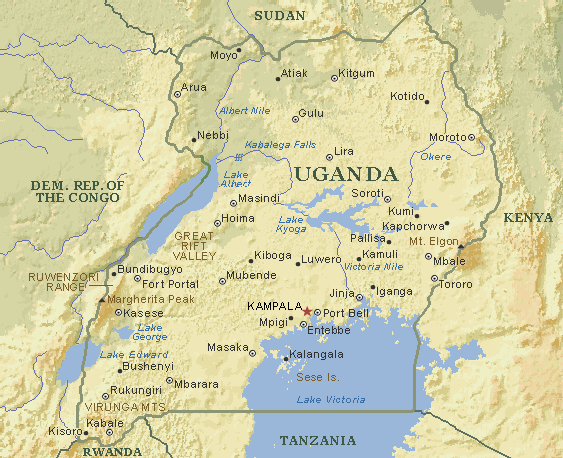
There are several reasons why I write, always: immortality, the imperative,
madness, quest—all these things. I write because there is always that desire
to say something about my experience of the world.—Monica Arac de
Nyeko
If you follow the Nile river from the Mediterranean south to its basin, you will find the country of Uganda, nestled among five other countries. On a map it looks small relative to its much larger neighbors, but it's nearly the size of the United Kingdom and just a bit smaller than New Zealand. Though landlocked, Uganda has abundant lakes and is rich in natural resources. A land of many ethnic groups and over 30 languages (though English and Swahili are the official ones), it is home to over 32 million people. Uganda's modern history reaches back through civil war, the ravages of AIDS, the dictatorship of Idi Amin, and independence from the colonial British. Its ancient history reaches back to the dawn of humankind. In the last few decades, Uganda is rebuilding and its economy is growing, and within this revival, cultural expressions are flourishing, including literature. It is here where the women of Uganda are creating space to tell their stories and write their books with the help of a grassroots support group started by a few women writers.
FEMRITE, the Ugandan Women Writers' Association, was launched in 1996 by a small group of women with the aim of "creating an enabling atmosphere for women to write tell and publish their stories." Award-winning author Goretti Kyomuhendo, one of the early founders of the group, tells us that:
The group's mission was not without challenges. Lack of funding was a major problem, says Kyomuhendo, but also, "most people in Uganda did not understand why we had to establish a gender-defined writers support group. We had a lot of explaining to do. Most people did not know that as women writers, we had problems which were particular to us, such as, lack of time and space to write (in Africa, a woman is the homemaker, the one who puts food on the table, the child-minder, and she does not only look after and cater for her immediate family, but the extended one as well)."
Getting published is another big challenge for an African woman writer, says author Jocelyn Ekochu. "In most African countries, including Uganda, publishers are only interested in textbooks, which ensure a good return on their money. In addition, there is this mistaken belief that women write about women's issues and publishers are just not interested. An African woman has to be very famous for a good publisher to be interested in her work."
Since its inception, FEMRITE has worked diligently to promote the women writers of Uganda to wider readership, embracing all avenues available to them. They continue to hold workshops and readings, and are working to develop marketing and communication strategies, develop a dynamic resource center, and publish worthy books - novels, short fiction, poetry and memoir. Their web site—www.femriteug.org—not only provides general information about the group, but showcases their publications and their members' literary achievements.
But there are other achievements as well. Kyomuhendo tells us that "offering women a platform to write and publish, an identity as women writers, and a home where they can meet, share experiences, and feel accepted" is an achievement. Personal empowerment is another. "At first, many women withheld and avoided writing about the stories in their hearts because they did not want to face up to what society would think of them, if they divulged those secrets buried deep in their hearts: stories about difficult childhoods, about motherhood, about womanhood, about loss and love and betrayal," says Kyomuhendo. Many of the FEMRITE workshops talked about what it means to be "a writer, a woman writer, and an African woman writer." Belletrista is pleased to be able to introduce her readers to just a few of the exceptional women authors of Uganda.
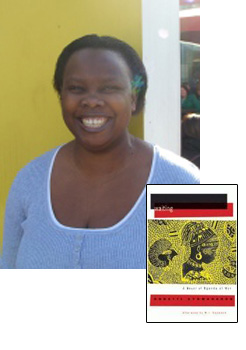
GORETTI KYOMUHENDO was born in 1965 and grew up in Hoima, Uganda. She holds an M.A. in creative writing from the University of KwaZulu-Natal in Durban, South Africa. Kyomuhendo helped found and is now the program coordinator of FEMRITE. She is the author of Waiting: a Novel published by the Feminist Press in NYC and two previous novels, The First Daughter and Secrets No More, the winner of the Uganda National Literary Award for Best Novel in 1999 (Fountain Publishers and Femrite Publications, Ltd respectively). Kyomuhendo was the first Ugandan woman to receive an International Writing Program Fellowship at the Unversity of Iowa in the United States. She currently lives in London and is working on a new novel around the theme of immigration.
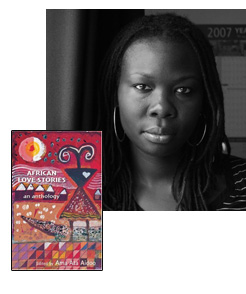
"FEMRITE gave [me] a place and space to write with a network of support and mentorship—handy when you are starting out," says MONICA ARAC DE NYEKO. De Nyeko grew up in Northern Uganda and was educated at Makerere University (Uganda) and the University of Groningen (the Netherlands) where she pursued a Masters degree in humanitarian assistance. The recipient of several awards, De Nyeko won the Caine Prize for her story "Jambula Tree" in 2007. The story was published in African Love Stories: an Anthology, edited by Ama Ata Aidoo and published by Ayebia Clarke Publishing Ltd. Another of her notable stories which was shortlisted for the Caine Prize in 2004, "Strange Fruit", can be read online.
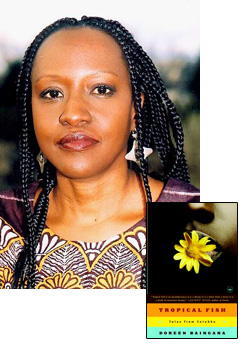
"I write to try and understand the world. To explore why we humans do the things we do. I pose questions, not necessarily expecting an answer. I love language and words and love playing among them. Also, I want to showcase all the nuances of diverse African experiences," says DOREEN BAINGANA. Baingana is the author of Tropical Fish: Stories out of Entebbe, which won the Commonwealth Prize for First Book, Africa Region, and the AWP Award for Short Fiction. She has been a finalist twice for the Caine Prize for African Writing, and has published stories and essays in American journals such as Glimmer Train and African American Review, in The Guardian, UK, Chimurenga and Kwani?, and in the major East African newspapers. Ms. Baingana has a law degree from Makerere University, Uganda, and an M.F.A. from the University of Maryland, USA. She has taught creative writing at various institutions including the University of Maryland, the Writers Center in Bethesda, Maryland, the SLS/Kwani? literary festivals in Kenya and with FEMRITE in Uganda. She worked with Voice of America radio for ten years. Doreen Baingana is now an editor at Storymoja, a new publishing house in Nairobi, Kenya.
"Femrite is a literary home of sorts, for me. When I used to live in the US, whenever I came home to visit, the women of Femrite welcomed me. It was a place to share my interest in and ideas about writing with like-minded people. Feeling and being part of a community cannot be underestimated," says Baingana. When asked how the success of Tropical Fish has affected her, she responded, "It has validated me as a writer. One works in isolation, but the reception of a book is a public act. One is not respected as a writer for doing the main thing, writing, but for the final product, once it is recognised with awards and the like. It some ways though it is rather intimidating because I am no longer writing in a vacuum – I feel as if there is a certain expectation of me and my writing. Can I fulfill it, is the question. Do I want to? Yes and no." Baingana, who has been writing non-fiction of late, is also currently writing novel of a female rebel soldier, how she survives in man's world.
Listen to a 2005 National Public Radio interview with Doreen Baingana here.
BANANUKA JOCELYN EKOCHU holds a Bachelors degree in commerce from Makerere Unversity, a Higher Diploma in Marketing from the Makerere University Business School, and a Masters degree in Management studies and a post graduate diploma in Financial Management, both from the Uganda Management Institute. Currently she works as an accountant for the Centre for Women in Governance and edits The Candle magazine on a voluntary basis.
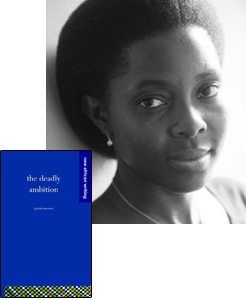
GLAYDAH NAMUKASA is an author and a midwife in Uganda. She has written one novel, The Deadly Ambition, and a young adult novel, The Voice of a Dream, the 2006 winner of the Macmillan literary prize for Africa in the young adult division (Macmillan, paperback, 9781405095921), and several short stories. Her work has appeared in journals and anthologies in Uganda, South Africa, Sweden, and the UK. As a member of FEMRITE, Namukasa says the group "nurtured and groomed me as un upcoming writer. I had access to creative writing textbooks, novels, I joined the Readers-Writers' club where my work was read and commented upon. I got to learn the first weaknesses in my writing and I worked with such criticism to write better. FEMRITE exposed me to writers and to the writer's world, and to the world of writing better."
When asked about her unusual dual career path—writing and midwifery, Namukasa told us,
Namukasa is currently a writer-in-residence at the Ledig House International writers colony in Hudson, New York (US). She is working on her third novel, an historical novel set in the 1960s when Uganda won its independence from the British.
These are just five of the many talented Ugandan women authors writing today.
They bring us stories from a part of the world most of us have not visited,
and yet their stories touch us in the universal sense for as human beings do
we not all basically want the same things? As readers and supporters of women
writers, we can support these writers by reading and purchasing their books
(new rather than used or secondhand) or by making a donation to FEMRITE.
Waiting by Goretti Kyomuhendo, Feminist Press, paperback, 9781558615393
African Love Stories, edited by Ama Aidoo (includes Monica de Nyeko's Caine
prize-winning story), Ayebia Clarke Pub., LTD, paperback, 9780954702366.
Tropical Fish: Stories Out of Entebee by Doreen Baingana, Univ. of Massachusetts Press, hardcover, 9781558494770 or Harlem Moon, paperback, 9780767925105.
Shock Waves Across the Ocean by Bananuka Jocelyn Ekochu, FEMRITE Publications, paperback, 9970700030.
Deadly Ambition by Glaydah Namukasa, Mallory International, paperback, 9781856571036
These books and others by these authors can be found though one's usual book sources, the FEMRITE offices,
or the African Book Collective (UK): http://www.africanbookscollective.com/
or through Michigan State Univ. (US): http://msupress.msu.edu/african%20books_.php
Photo credits: Ms. Namukasa's photo: Thomas Langdon. Ms. de Nyeko's photo: Allan Gichigi